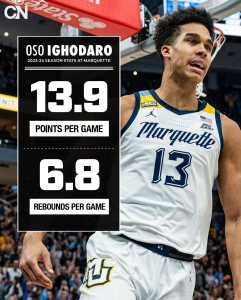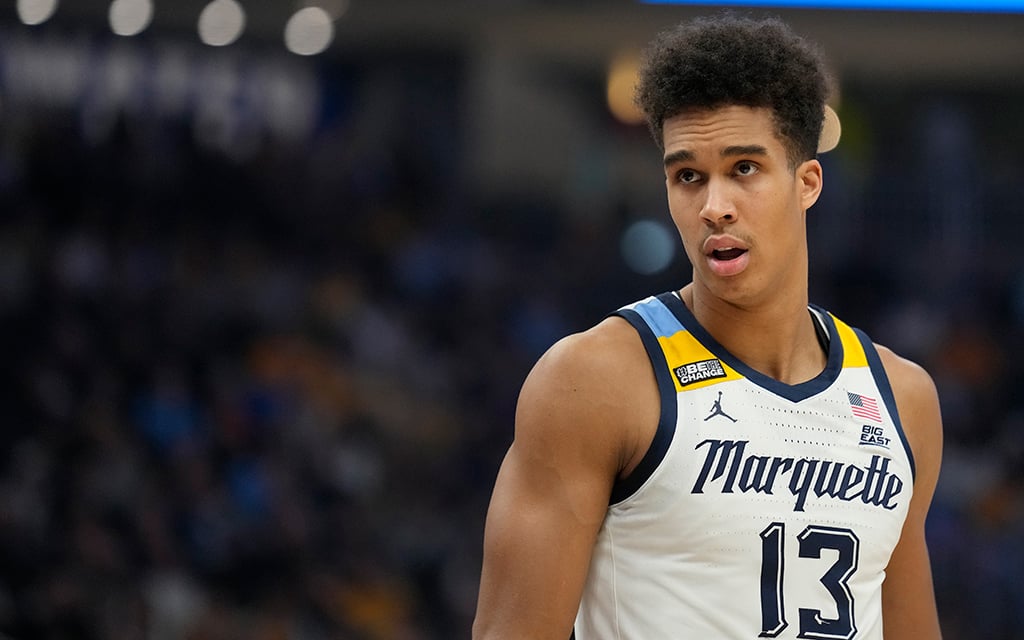PHOENIX – Playing basketball was always a dream for Chandler native Oso Ighodaro. However, his parents had other ideas for him.
Growing up in a strict school-driven household, academics always came before athletics, no matter what, and because of that, Ighodaro did not start playing organized basketball until he attended Desert Vista High School.
“I always really wanted to play, but my parents wanted me to just focus on school and make sure I was strong in the classroom,” Ighodaro said. “Then in high school, they started to let me play.”
But, this necessarily wasn’t a bad thing. The heavy influence of his parents’ academic standards made Ighodaro gain important life skills that will not only be useful as an athlete but in the real world, too.
Skills such as being able to problem-solve and being attentive are obtained through life experiences and school. With Ighodaro, he was used to these skills being implemented through his parents and the classroom, and that only gave him an advantage when he was finally able to play basketball.
But how did Marquette’s senior forward who didn’t get into organized basketball until high school turn into one of the Big East’s top players who is coming off an All-Big East Second Team award?
It all started with freshman-year basketball tryouts, where Ighodaro caught the eye of former Desert Vista coach Gino Crump.
“I saw something in him early on that stood out,” Crump said. “I watched (him) when he initially played with the freshmen and the thing that stood out about Oso was that he was the tallest of the freshmen. Typically, very tall young players can’t dribble very well and certainly don’t have an advanced IQ and when a rebound comes off the rim, the smaller players look to hoist it and give him the ball to bring it up the court. It fascinated me.”
Usually starting a sport years after most kids begin playing will hold them back as they have to play catch-up to compete consistently, but Ighodaro was different. From the moment he started playing, a natural, competitive drive to continually learn and get better took over.
“I definitely had to work to catch up with the guys already ahead of me,” Ighodaro said. “I think that gave me an advantage (starting later) in that it’s still kind of fresh for me. I think a lot of guys get burnt out when they start playing at four or five years old.”
Following his freshman season, he began playing organized basketball in the summer, and that is where he met Mike Smith, a former assistant coach at Desert Vista and a barber at The Shop by Lefty’s.
“At the end of the year (freshman season), I met him and then I invited him to come play with us,” Smith said. “We had a good team at the time and he took the challenge to come and play for me and that’s where our relationship started.”
Even with all of the non-coachable tendencies that Ighodaro gained, he was able to shine his brightest in the 2019-20 6A state championship, where he finished with a game-high 32 points, 11 rebounds and six blocks to lead Desert Vista to its second state championship.
Ighodaro received high praise from his coaches for the effort he displayed in the final.

(Graphic by Dominic Contini/Cronkite News)
“His stats were incredible and it was just a masterful performance,” Crump said. “I mean, he had blocked shots, assists, three-pointers, and dunks and he filled the stat sheet in that game. (He was just) the whole package. I mean, you just don’t see that in a state championship game. It was a great send-off for him as a high school basketball player.”
But what sets Ighodaro apart from his peers on and off the basketball court?
It’s his character. Good character is defined by integrity, kindness and a strong sense of moral responsibility. It reflects a person’s ethical choices and their commitment to treating others with respect and empathy.
And Ighodaro does just that.
“His character (separates himself),” Crump said. “His parents did a tremendous job with him as a young man and he has his character off the chart, (along with) his intellect and IQ. He’s just a very bright young man who’s very focused. More so than most kids I’ve ever coached.”
The attentiveness to detail learned throughout his life allowed Ighodaro to be an example for his teammates.
Smith believes Ighodaro’s leadership and his ability to be very coachable allows Ighodaro to be such a versatile, well-rounded basketball player. He is averaging just under 14 points per game, seven rebounds and shooting at an efficient 62% from the field.
“He was one of the kids that you don’t have to worry about,” Smith said. “He’s going to act like he does in front of his parents. But as far as it leads to the court, too, he’s very coachable. So it’s easy, he’s easy to deal with and he’s really a great kid.”
Upon arriving in Milwaukee, Ighodaro described his decision to leave the West Coast and attend Marquette as the best of both worlds regarding academics and basketball.
Even through a coaching change, Ighodaro has found that Marquette has been the right fit for him and that he has loved every minute of playing under Shaka Smart and in the Big East conference.
When reflecting on his time being a Golden Eagle, one memory has stuck with him like no other – winning the Big East Championship last year.
“It felt almost like the state championship, like something that’s going to be with me for the rest of my life,” Ighodaro said.
However, there is a bigger picture this season for Ighodaro and Co. with the Final Four being held in Arizona in April and a chance for Marquette to hoist its second national championship trophy.
“It’d be huge,” Ighodaro said. “I mean, I can’t really think of a better way to end my college career than winning a national title in my hometown.”
His former Desert Vista coaches also believe that it will be the perfect full-circle moment for him as a player with the chance to play in front of his hometown peers.
“It’d be a great homecoming for him,” Crump said. “I know I’d be there to watch for sure. I mean, he had a heck of a college career and for it to end in Arizona would be special.”


